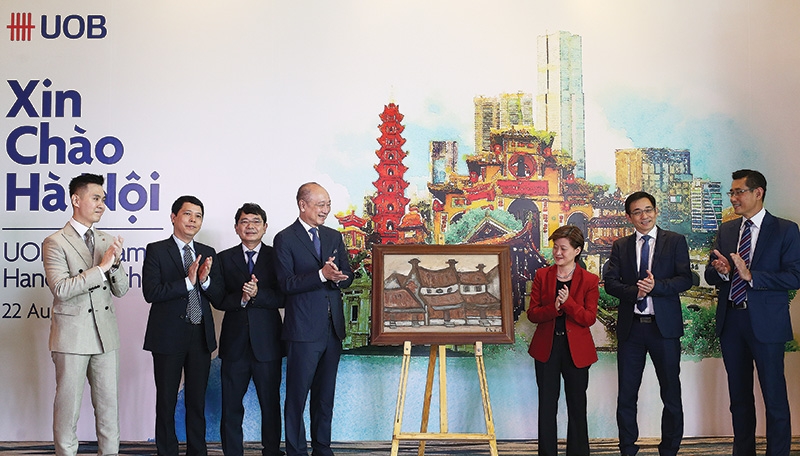UOB expands with new Hanoi branch
 |
| Leaders of UOB Vietnam held the opening event for the launch of the new branch in Hanoi last week |
United Overseas Bank Vietnam, a wholly-owned subsidiary of United Overseas Bank Ltd., (UOB) which boasts a global network of more than 500 offices in 19 countries and territories in Asia-Pacific, Europe, and North America, officially opened the Hanoi branch last Thursday.
The expansion comes a year after the incorporation of UOB Vietnam as a foreign-owned subsidiary, underlying the bank’s commitment to providing its financial services and solutions to more customers across the country.
The Hanoi branch, located on Thanh Nien Road in Hanoi’s Ba Dinh district, was opened by Catherine Wong, Singapore’s Ambassador to Vietnam, and Wee Ee Cheong, deputy chairman of UOB.
“The opening of our Hanoi branch marks another milestone in UOB’s long-term commitment to the country,” said Cheong. “We were the first Singaporean bank to set up a representative office in Ho Chi Minh City in 1993 and since then, have continued to deepen our presence, connecting clients across our extensive network to business opportunities in Vietnam.”
“In meeting the needs of customers, we are also focused on creating jobs and providing continual training opportunities for our colleagues in Vietnam,” Cheong added. “We ensure that our bankers have the right mindset and skillsets, guided by UOB’s values of honour, enterprise, unity, and commitment to provide the right solutions and support for the growth and success of our customers.”
According to Ambassador Wong, as the first Singaporean bank with a subsidiary in Vietnam, UOB is a strong example of a successful Singaporean organisation expanding and investing into Vietnam. The bank has also supported many companies in their expansion into Vietnam, providing connectivity and facilitating investment flows into the country. “With both Vietnam’s and Singapore’s governments striving for a closer strategic partnership, UOB has played an important role in particular, to help drive greater economic collaboration between the two countries,” she said.
Harry Loh, CEO of UOB Vietnam, said that Hanoi is positioned as an important gateway for businesses to tap into opportunities in Vietnam’s fast-growing cities in the north.
“Our Hanoi branch complements our headquarters in Ho Chi Minh City in providing financial solutions that are essential to the different life and business stages of consumers and companies here in Vietnam. Our presence, backed by the seamless connectivity offered through UOB’s regional network, ensures that we are well-positioned to help customers realise their financial and business goals,” Loh said.
To commemorate the official opening of the Hanoi branch, UOB Vietnam presented a cheque of VND200 million ($8,650) to the Golden Hearts charity programme operated by New Hanoi newspaper, helping provide school supplies to 100 children from underprivileged families in Hanoi for the new academic year.
The move to scale up operations through opening the Hanoi branch was partly explained by recent in-depth studies compiled by UOB’s expert team highlighting Vietnamese market attraction in the eyes of foreign investors. The studies were shared at UOB’s recent event in Hanoi, which secured the attendance of the bank’s top leaders and senior economists.
Accordingly, a report conducted by UOB named “Vietnam: Asia’s Bright Spot Amid Trade Tensions” indicated that thanks to robust domestic demand and increasing foreign direct investment, Vietnam’s economy is expected to expand 6.7 per cent in 2019 as one of the fastest-growing economies in the world.
Vietnam, with its strategic location for production and distribution of goods by land and sea, is one such country for the world’s export production activities.
Also noted in UOB’s studies, another strength of Vietnam as an export production base is its excellent network of trade agreements, in which a total of 13 free trade agreements have been signed and another three are under negotiation.
The agreements provide Vietnamese exports with tariff cuts or eliminations, and offer opportunities for manufacturers relocating to Vietnam to sell to more partners at minimised cost.
In this context, and as the trade dispute between the United States and China shows little signs of abating, Vietnam is becoming one of the key Asian destinations for foreign manufacturers in relocating their production facilities.
What the stars mean:
★ Poor ★ ★ Promising ★★★ Good ★★★★ Very good ★★★★★ Exceptional
Related Contents
Latest News
More News
- Banking sector targets double-digit growth (February 23, 2026 | 09:00)
- Private capital funds as cornerstone of IFC plans (February 20, 2026 | 14:38)
- Priorities for building credibility and momentum within Vietnamese IFCs (February 20, 2026 | 14:29)
- How Hong Kong can bridge critical financial centre gaps (February 20, 2026 | 14:22)
- All global experiences useful for Vietnam’s international financial hub (February 20, 2026 | 14:16)
- Raised ties reaffirm strategic trust (February 20, 2026 | 14:06)
- Sustained growth can translate into income gains (February 19, 2026 | 18:55)
- The vision to maintain a stable monetary policy (February 19, 2026 | 08:50)
- Banking sector faces data governance hurdles in AI transition (February 19, 2026 | 08:00)
- AI leading to shift in banking roles (February 18, 2026 | 19:54)

 Tag:
Tag:




















 Mobile Version
Mobile Version